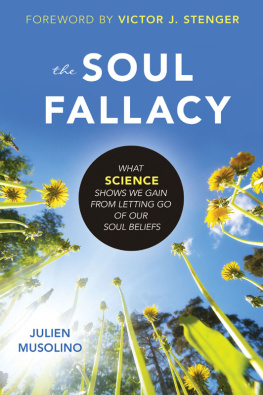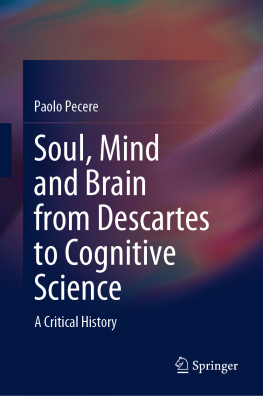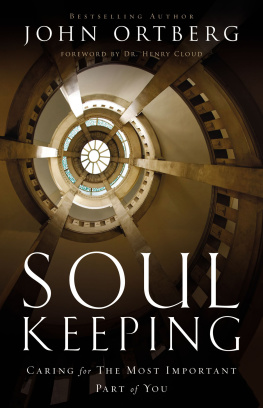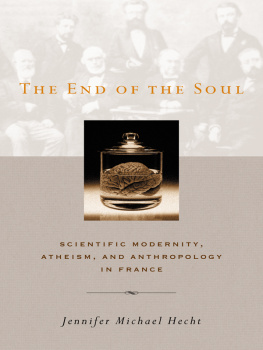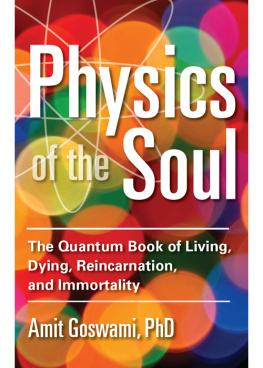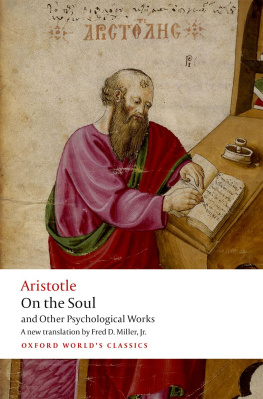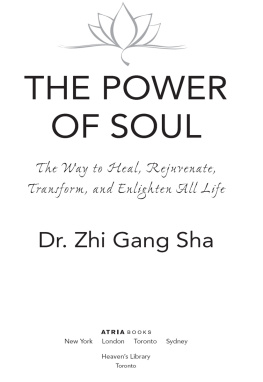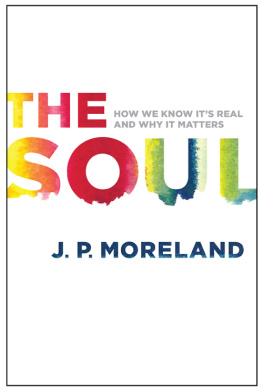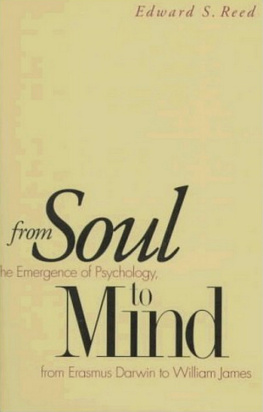
Julien Musolino is a Franco-American cognitive scientist and an associate professor at Rutgers University, where he directs the Psycholinguistics Laboratory and holds a dual appointment in the Department of psychology and the internationally renowned Center for Cognitive Science. He is the author of numerous scientific articles, and his research has been funded by the National Institutes of Health and the National Science Foundation.

Alcock, James. Back from the Future: Parapsychology and the Bem Affair. Skeptical Inquirer, March/April 2011. Available at Committee for Skeptical Inquiry. http://www.csicop.org/specialarticles/show/back_from_the_future.
Alexander, Eben. Proof of Heaven: A Neurosurgeon's Journey into the Afterlife. New York: Simon & Schuster, 2012.
Aristotle. De Anima. Oxford: Oxford University Press, 1979.
Baker, Mark C., and Stewart Goetz, eds. The Soul Hypothesis: Investigations into the Existence of the Soul. New York: Continuum, 2011.
Banerjee, K., O. Haque, and E. Spelke. Melting Lizards and Crying Mailboxes: Children's Preferential Recall of Minimally Counterintuitive Concepts. Cognitive Science 37, no.7 (2013): 125189.
Barker, A. T., R. Jalinous, and I. L. Freeston. Non-Invasive Magnetic Stimulation of the Human Motor Cortex. Lancet 8437 (1985): 11061107.
Bartsch, Karen and Henry Wellman. Children Talk about the Mind. Oxford: Oxford University Press, 1994.
Bayley, Barrington J. The Seed of Evil. London: Allison & Busby, 1979.
Beauregard, Mario, and Denyse OLeary. The Spiritual Brain: A Neuroscientist's Case for the Existence of the Soul. New York: HarperOne, 2007.
Bering, Jesse, and David Bjorklund. The Natural Emergence of Reasoning about the Afterlife as a Developmental Regularity. Developmental Psychology 40, no. 2 (2004): 21733.
Biran, I., and A. Chatterjee. Alien Hand Syndrome. Archives of Neurology 61 (2004): 29294.
Blackmore, Susan. Dying to Live: Science and the Near Death Experience. London: Grafton, 1993.
Blanke, Olaf, Stphanie Ortigue, Theodor Landis, and Margitta Seeck. Stimulating Illusory Own-Body Perceptions. Nature 419 (2002): 26970.
Bloom, Paul. Descartes Baby: How the Science of Child Development Explains What Makes Us Human. New York: Basic Books, 2004.
. Religion, Morality, Evolution. Annual Review of Psychology 63 (2012): 17999.
. Worse Than Creationism: Evolution, Neuroscience, and the Responsibility of Psychologists. American Psychological Society: Observer 18, no. 10 (2005). http://www.psychologicalscience.org/index.php/publications/observer/2005/october-05/worse-than-creationism-evolution-neuroscience-and-the-responsibility-of-psychologists.html.
Boyer, Pascal. Religion Explained: The Evolutionary Origin of Religious Thought. New York: Basic Books, 2001.
Bremmer, Jan. The Early Greek Concept of the Soul. Princeton, NJ: Princeton University Press, 1983.
Brillouin, Lon. Maxwell's Demon Cannot Operate: Information and Entropy I. Journal of Applied Physics 22 (1951): 33437.
. Science and Information Theory. New York: Academic Press, 1956.
Casali, Adenauer, Olivia Gosseries, Mario Rosanova, Melanie Boly, Simone Sarasso, Karina R. Casali, Silvia Casarotto, et al. A Theoretically Based Index of Consciousness Independent of Sensory Processing and Behavior. Science Translational Medicine 5, no.198 (2013): 105.
Cave, Stephen. Immortality: The Quest to Live Forever and How It Drives Civilization. New York: Crown, 2012.
. What Science Says about the Soul. Skeptic Magazine 18, no. 2 (2013): 1618.
Chomsky, Noam. Language and Problems of Knowledge. Cambridge, MA: MIT Press, 1988.
. Linguistics and the Cognitive Science: Problems and Mysteries. In The Chomskyan Turn, edited by A. Kasher, pp. 2653. Oxford: Basil Blackwell, 1991.
. On the Nature, Use, and Acquisition of Language. In Handbook of Child Language, edited by William C. Ritchie and Tej K. Bhatia, pp. 3354. New York: Academic Press, 1999.
. The Prosperous Few and the Restless Many. Berkeley, CA: Odonian, 1993.
Chopra, Deepak. Life after Death: The Burden of Proof. New York: Harmony Books, 2006.
Churchland, Patricia. Moral Decision-Making and the Brain. In Neuroethics: Defining the Issues in Theory, Practice, and Policy, edited by Judy Illes, pp. 316. Oxford: Oxford University Press, 2006.
. Touching a Nerve: The Self as Brain. New York: W. W. Norton, 2013.
Churchland, Paul M. Matter and Consciousness. Cambridge, MA: MIT Press, 2013.
Clarke, Arthur C. Hazards of Prophecy: The Failure of Imagination. in Profiles of the Future: An Inquiry into the Limits of the Possible. New York: Harper & Row, 1962.
Collins, Robin. The Energy of the Soul. In The Soul Hypothesis: Investigations into the Existence of the Soul, edited by Mark Baker and Stewart Goetz, pp. 12333. New York: Continuum, 2011.
Crick, Francis. The Astonishing Hypothesis: The Scientific Search for the Soul. New York: Charles Scribner's Sons, 1994.
Dawkins, Richard. The God Delusion. Boston: Houghton Mifflin, 2006.
Debruyne, H., M. Portzky, F. Van Den Eynde, and K. Audenaert. Cotard's Syndrome: A Review. Current Psychiatry Reports 11 (2009): 197202.
Dehaene, Stanislas. Consciousness and the Brain: Deciphering How the Brain Codes Our Thoughts. New York: Viking, 2014.
Dehaene, Stanislas, Lionel Naccache, Gurvan Le ClecH, Etienne Koechlin, Michael Mueller, Ghislaine Dehaene-Lambert, Pierre-Francois van de Moortele, and Denis Le Bihan. Imaging Unconscious Semantic Priming. Nature 395 (1998): 297300.
Dennett, Daniel. Consciousness Explained. Boston: Little, Brown, 1991.
. Elbow Room: The Varieties of Free Will Worth Wanting. Cambridge, MA: MIT Press, 1984.
. Freedom Evolves. New York: Penguin, 2003.
. Intuition Pumps and Other Tools for Thinking. New York: W. W. Norton, 2013.
. Sweet Dreams: Philosophical Obstacles to a Science of Consciousness. Cambridge, MA: Bradford Books, 2006.
Desmurget, Michel, Karen T. Reilly, Nathalie Richard, Aleandru Szathmari, Carmine Mottolese, and Angela Sirigu. Movement Intention after Parietal Cortex Stimulation in Humans. Science 324, no. 5928 (2009): 81113.
DSouza, Dinesh. Life after Death: The Evidence. Washington, DC: Regnery, 2009.
Ebbern, Hayden, Sean Mulligan, and Barry L. Beyerstein. Maria's Near Death Experience: Waiting for the Other Shoe to Drop. Skeptical Inquirer 20, no. 4 (1996): 4660.
Edgell, Penny, Joseph Gerteis, and Douglas Hartman. Atheists as Other: Moral Boundaries and Cultural Membership in American Society. American Sociological Review 71 (2006): 21134.
Einstein, Albert. The World as I See It. Secaucus, NJ: Citadel, 1999.
Elbert, Jerome W. Are Souls Real? Amherst, NY: Prometheus Books, 2000.
Feinberg, Todd E. Altered Egos: How the Brain Creates the Self. Oxford: Oxford University Press, 2001.
Flanagan, Owen. The Problem of the Soul: Two Visions of the Mind and How to Reconcile Them. New York: Basic Books, 2002.
Fodor, Jerry. The Mind-Body Problem. In The Mind-Body Problem, edited by R. Warner and T. Szubka, pp. 2440. Oxford: Blackwell, 1994.
Fox, Mark. Religion, Spirituality, and the Near-Death Experience
Next page
